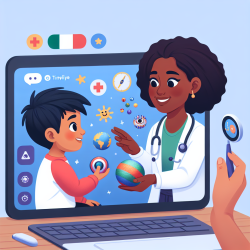As an Educational Psychologist, you are dedicated to the holistic development of children, ensuring they have the tools and support they need to succeed academically and socially. In today's rapidly evolving educational landscape, one of the most pressing challenges is addressing the diverse needs of students with speech and language difficulties. This is where online therapy services, like those provided by TinyEYE, come into play.
The Role of Online Therapy in Modern Education
The advent of online therapy has revolutionized how educational support services are delivered. It offers a flexible, scalable, and effective solution for schools facing therapist staffing shortages, geographic barriers, or logistical challenges. Online speech therapy, in particular, has shown remarkable success in engaging children and delivering consistent, high-quality interventions.
Benefits of Online Speech Therapy
Online speech therapy offers several advantages that can significantly enhance the educational experience for students:
- Accessibility: Students can receive therapy regardless of their location, ensuring that even those in remote or underserved areas have access to essential services.
- Consistency: Regular sessions can be scheduled without the disruptions that often accompany in-person therapy, such as therapist travel or school closures.
- Engagement: Interactive and multimedia tools used in online therapy can make sessions more engaging for children, helping to maintain their interest and motivation.
- Data-Driven: Online platforms often come with built-in data tracking and reporting tools, allowing for real-time monitoring of student progress and more informed decision-making.
Implementing Online Therapy in Schools
For schools considering the integration of online therapy services, it's essential to approach the implementation process thoughtfully. Here are some key steps to ensure a successful rollout:
1. Assess Needs and Resources
Begin by conducting a thorough needs assessment to understand the specific requirements of your student population. This includes identifying the number of students needing speech therapy, the severity of their needs, and any existing resources or gaps in service delivery.
2. Choose a Reliable Provider
Select a reputable online therapy provider, like TinyEYE, that has a proven track record of success. Look for providers that offer comprehensive services, including assessment, therapy, and progress monitoring. It's also important to ensure that the platform is user-friendly and secure, protecting student privacy and data.
3. Train Staff and Students
Provide training for both staff and students to familiarize them with the online therapy platform. This includes technical training on how to use the software, as well as best practices for conducting and participating in online therapy sessions.
4. Monitor and Evaluate
Regularly monitor the effectiveness of the online therapy services. Collect feedback from students, parents, and therapists to identify areas for improvement. Use data from the therapy platform to track student progress and make data-driven decisions about the continuation or adjustment of services.
Case Study: Success Stories from TinyEYE
To illustrate the impact of online speech therapy, let's look at a few success stories from TinyEYE's extensive experience in providing these services:
Case Study 1: Rural School District
A rural school district faced significant challenges in providing consistent speech therapy services due to a shortage of qualified therapists. By partnering with TinyEYE, the district was able to offer regular online speech therapy sessions to its students. Over the course of the school year, students showed marked improvements in their speech and language skills, and the district reported higher satisfaction levels among parents and staff.
Case Study 2: Urban Charter School
An urban charter school with a diverse student population implemented TinyEYE's online therapy services to address the varying speech and language needs of its students. The interactive and engaging nature of the online sessions helped to maintain high levels of student participation and progress. The school noted significant gains in student speech outcomes and praised the data tracking features of the platform for helping to tailor interventions to individual student needs.
Conclusion
Online therapy services, such as those provided by TinyEYE, represent a transformative approach to supporting the speech and language development of children in schools. By leveraging technology, schools can overcome traditional barriers to service delivery and ensure that all students have access to the support they need to thrive. As Educational Psychologists, embracing these innovative solutions can help you continue to grow your knowledge and better serve your students.










